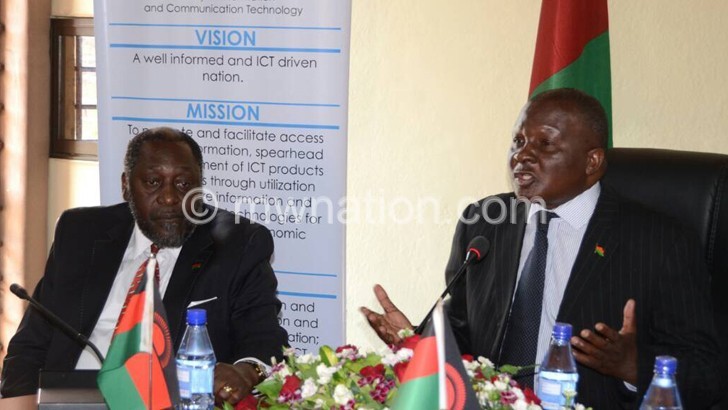Government on defence as blood sucking crisis spreads
While tension and fear ensue in areas affected by reports of “blood sucking”, government has failed to explain how it plans to contain the situation.
Instead, Cabinet ministers who held a press conference to address the issue in Lilongwe pushed the blame on opposition political parties and civil society organisations (CSOs).

During the news conference, both Minister of Information and Communication Technology Nicholas Dausi and Minister of Industry, Trade and Tourism Henry Mussa described the “blood suckers” attacks as ‘mythical’ and appealed for “concerted effort” to deal with the situation.
The two Cabinet ministers also claimed there were invinsible political hands behind the incidents allegedly to tarnish the image of the Democratic Progressive Party (DPP) administration.
Mussa told journalists the whole issue hinges on rumours as there is no evidence of any person ‘sucked of blood’ in Mulanje and other areas where such cases have been reported.
He said government will deploy a team to intensify civic education nationwide on the incidents that have so far claimed six lives—one in Nsanje and five in Mulanje.
He said: “Nobody can stand up and show us that they had a pint of blood taken from them by alleged suckers. This is a myth which is tarnishing the good image of our country.”
Both Mussa and Dausi repeatedly emphasised that they do not rule out political influence in the incidences, wondering why only one part of the country—the Southern Region—has become vulnerable to the attacks.
“We have 55 political parties in this country, 515 CSOs [civil society organisations]? Why are they quiet on this issue where life has been lost?” said Dausi, who particularly mentioned the opposition Malawi Congress Party (MCP) over its silence on the issue as a cause for suspicion.
But MCP deputy secretary general Eisenhower Mkaka said the accusation against his party was unfortunate and an indication that the DPP administration lacks direction in running government affairs.
He said: “If they have evidence it is MCP behind these acts why not taking us to task? These allegations are an admission that they have failed to run government. Let them step aside and allow others to take over.”
Dausi also hit at the country’s CSOs for failing to intervene on a matter that hinges on human life.
He said: “Why are CSOs not condemning this? Why are they quiet? Ikanakhala nkhani yokwatirana amuna okhaokha akanatulukira [If it was about gay marriages they could have intervened].”
But Centre for the Development of People (Cedep) executive director Gift Trapence, whose organisation promotes minority rights, took a swipe at government for diverting people’s attention from the real issue of concern in Mulanje, Phalombe, Nsanje and other areas.
He said even if CSOs were quiet, government cannot afford silence on the matter because it has an obligation to protect its citizens.
Said Trapence: “They ought to be proactive. Provide information to the people.”
During the news conference, Mussa admitted the Mulanje incidences have the potential to affect the tourism industry.
In an apparent reference to the United State of America (USA) Embassy recall of US volunteers in Mulanje and some affected areas, Dausi appealed to donors not to rush to withdraw their workers and writing their governments about the current issue in the country. He said the situation was under control.
He said government is set to roll out civic education with Cabinet ministers and Ministry of Civic Education, Culture and Community Development officials going around the affected areas to raise awareness. However, he could not explain when and how the exercise will be carried out.
Dausi also said President Peter Mutharika, in his capacity as Commander in Chief of the armed forces, has directed a 24-hour operation in all affected areas, but he could not be drawn to comment on what this operation is all about, saying: “It’s a presidential directive to ensure that there is maximum security nothing more on the operation.”
This is not the first time people have been attacked and killed based on some beliefs and the issue of blood suckers has a long history in Malawi.
In early 2000s, the media was awash with stories of blood suckers, which affected almost the same districts under attack this time around. The country has also seen the killing and attacks of people with albinism on suspicion that their bones are worth a lot of money.
In an interview yesterday, Malawi Human Rights Commission (MHRC) executive secretary David Nungu said the commission, with support from the United Nations Development Programme (UNDP), will from next week carryout a fact-finding mission to establish the cause of the incidents before carrying out a public inquiry on the matter.





